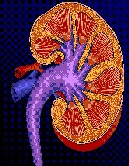Risk prediction models may be helpful in directing prognosis and treatment decisions
WEDNESDAY, March 25, 2015 (HealthDay News) — Risk prediction models with 16 characteristics may predict mortality risk in older adults with chronic kidney disease (CKD). The findings were published in the March issue of the Journal of the American Geriatrics Society.
Jessica W. Weiss, M.D., from the Oregon Health & Sciences University in Portland, and colleagues retrospectively evaluated data from individuals with severe CKD (estimated glomerular filtration rate, <30 mL/min per 1.73 m²; 1,915 patients aged 65 to 79 years; 2,139 patients aged ≥80 years). All patients received care at the Kaiser Permanente Northwest health maintenance organization between 2000 and 2008.
The researchers found that the risk prediction models used 16 characteristics to identify participants with the highest risk of mortality at two years. There was within 5 percent agreement for predicted and observed risks for each quintile, with a four- to five-fold difference in two-year predicted mortality risk observed between the highest and lowest quintiles. Models performed similarly with respect to mortality prediction at six months and two years in terms of discrimination and calibration for each age group.
“When validated, these risk prediction models may be helpful in supporting discussions about prognosis and treatment decisions sensitive to prognosis in older adults with CKD in real-world clinical settings,” the authors write.
Copyright © 2015 HealthDay. All rights reserved.








